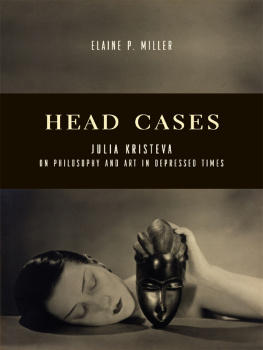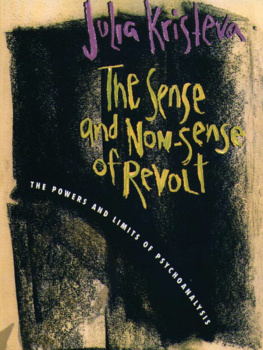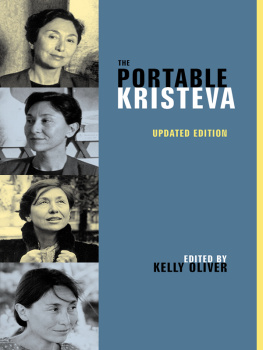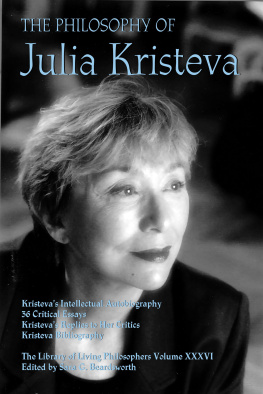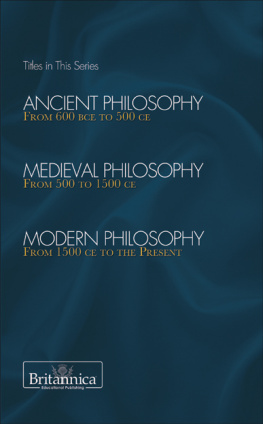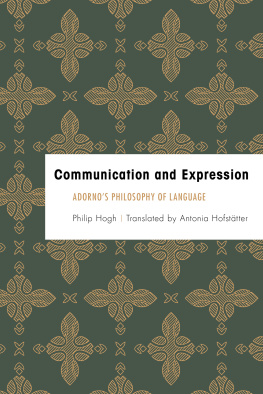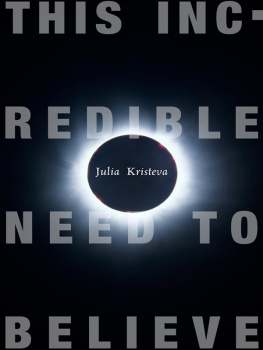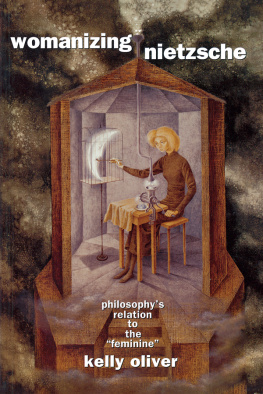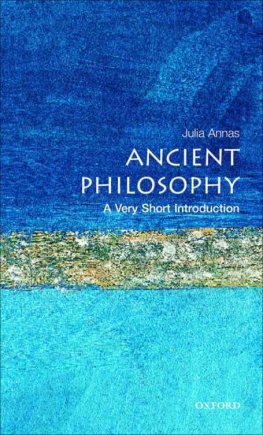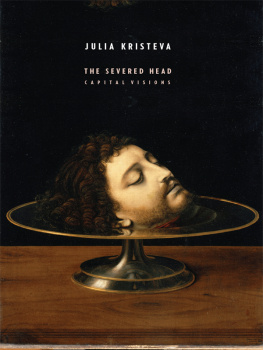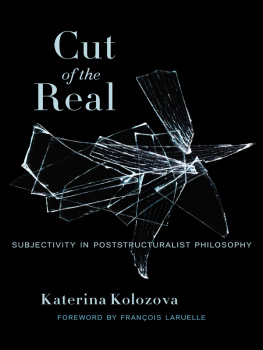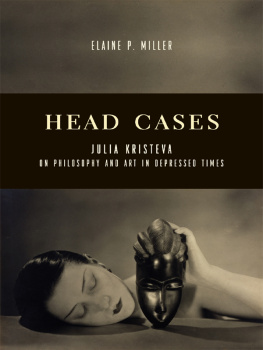HEAD CASES
COLUMBIA THEMES IN PHILOSOPHY, SOCIAL CRITICISM, AND THE ARTS
COLUMBIA THEMES IN PHILOSOPHY, SOCIAL CRITICISM, AND THE ARTS LYDIA GOEHR AND GREGG M. HOROWITZ, EDITORS
ADVISORY BOARD
Carolyn Abbate
J. M. Bernstein
Eve Blau
T. J. Clark
Arthur C. Danto
John Hyman
Michael Kelly
Paul Kottman
Columbia Themes in Philosophy, Social Criticism, and the Arts presents monographs, essay collections, and short books on philosophy and aesthetic theory. It aims to publish books that show the ability of the arts to stimulate critical reflection on modern and contemporary social, political, and cultural life. Art is not now, if it ever was, a realm of human activity independent of the complex realities of social organization and change, political authority and antagonism, cultural domination and resistance. The possibilities of critical thought embedded in the arts are most fruitfully expressed when addressed to readers across the various fields of social and humanistic inquiry. The idea of philosophy in the series title ought to be understood, therefore, to embrace forms of discussion that begin where mere academic expertise exhausts itself, where the rules of social, political, and cultural practice are both affirmed and challenged, and where new thinking takes place. The series does not privilege any particular art, nor does it ask for the arts to be mutually isolated. The series encourages writing from the many fields of thoughtful and critical inquiry.
For a complete list of titles. see .
HEAD CASES
JULIA KRISTEVA
ON PHILOSOPHY AND ART IN DEPRESSED TIMES
ELAINE P. MILLER
COLUMBIA UNIVERSITY PRESS/NEW YORK
COLUMBIA UNIVERSITY PRESS
PUBLISHERS SINCE 1893
NEW YORK CHICHESTER, WEST SUSSEX
Copyright 2014 Columbia University Press
All rights reserved
E-ISBN 978-0-231-53711-7
Library of Congress Cataloging-in-Publication Data
Miller, Elaine P., 1962
Head cases : Julia kristeva on philosophy and art in depressed times / Elaine P. Miller.
pages cm (Columbia themes in philosophy, social criticism and the arts)
Includes bibliographical references and index.
ISBN 978-0-231-16682-9 (cloth : alk. paper) ISBN 978-0-231-53711-7 (e-book)
1. Kristeva, Julia, 1941 2. Psychoanalysis and the arts. I. Title.
B2430.K7544M55 2014
194dc23 2013024130
A Columbia University Press E-book.
CUP would be pleased to hear about your reading experience with this e-book at .
JACKET IMAGE: MAN RAY, NOIRE ET BLANCHE, 1926
THE ISRAEL MUSEUM, BRIDGEMAN ART LIBRARY/ARS
JACKET DESIGN: CHANG JAE LEE
References to websites (URLs) were accurate at the time of writing. Neither the author nor Columbia University Press is responsible for URLs that may have expired or changed since the manuscript was prepared.
For Sofi and Leyla In loving memory of my mother, Susan Krahn Miller
Of all beings on earth, after birds, I prefer trees. Flowers that have grown and grown; not content to defy beauty, they defy the storms of time. They seem to embody the best of what humans desire. Topiary IV is a tree-woman, the perfect anti-siren. Instead of exchanging the lower half of her body for a fish-tail dreaming of fresh water, the tree-woman knows that one day her legs will fail; she will need a crutch before dying. But she keeps the lower half of her body as it was; she even dresses it, with the satin dress of a young girl blossoming into pubertyand adds a proliferating head. Her sap has risen to the top and, defoliated though she now is, this tree-woman can seduce nonetheless through the tufts of jewels put forth from the tips of her branches. The artist is man or womanbut certain women artists easily attain the psychic plasticity that transforms their ageing body into a blossoming tree. The trunk and branches may be dry, but the thing proliferates nonetheless, ascends, ramifies, budsnot in juicy flavours, but in emerald jewels. The seduction of crystallization.
Julia Kristeva, Louise Bourgeois: From Little Pea to Runaway Girl
CONTENTS
THIS BOOK WAS WRITTEN OVER A LONG PERIOD OF TIME AND with the help of a large number of people, some of whom I knew before I ever began to study philosophy and who are probably unaware of the inspiration they gave me. As a Mdchen aus der Fremde myself, at home in no particular country, the works of Julia Kristeva (in particular her readings of Louise Bourgeois and Hannah Arendt) gave me a framework for thinking about my own situation, one of philosophizing from out of an indeterminate origin as a foreigner who is also not a foreigner; in the throes of a disorienting melancholia, I was drawn to her discourse about art and aesthetics because it recognizes both the inhibitions and also the potential positive creative force of such a state of mind.
In 2006 I took a trip to Berlin (funded by a Miami University summer research award, for which I am grateful) to study countermemorials, sites commemorating the horrific events surrounding World War II in Germany, in a project that explored the conjunction of memory, loss, and art. That research eventually expanded to include psychoanalysis and the distinction between mourning and melancholia in our relation to the past, and from there to Kristeva, whose articulation of what I came to think of as a melancholic aesthetics seemed to fit perfectly into my earlier project. A 2008 Assigned Research Appointment from Miami University gave me the time I needed for putting together the first draft of the book.
Some of the chapters here began in very different form as invited lectures or essays. Thanks to Jeffrey Bernstein for inviting me to contribute to a special issue of Idealistic Studies an essay on iconoclasm, a subject I would probably never have reflected on otherwise but that ended up inspiring a whole new way of thinking about art. Mary Rawlinson invited me to give a keynote lecture at the Irigaray Circle, where juxtaposing Irigaray and Kristevas theories on art gave me valuable perspective and feedback as well as a warm, generous, and challenging interlocutor in Mary herself. Fanny Sderbck invited me to participate in an amazing roundtable discussion with Sara Beardsworth, Pleshette DeArmitt, Kelly Oliver, and Charles Shepherdson on Kristevas The Severed Head at the inaugural meeting of the Kristeva Circle in 2012. Dilek Hseyinzadean and Joe Weiss invited me to give the keynote lecture at the DePaul University graduate student conference in 2008, leading to rich discussion with them, Sina Kramer, and the other graduate students present; the dialogue contributed immensely to my thought process and revisions. Michael Naas, who was also present there and who has been a mentor since my graduate student days, contributed incalculably to the tightening up of conceptual distinctions in my discussion of photography (also the subject of a special issue of the Oxford Literary Review that he edited, inviting me to contribute an early version of parts of one chapter of this book) and pointed out new connections to Proust. I cannot thank him enough for all the inspiration, guidance, and friendship he has so generously given me over the years.
My editors at Columbia University Press, Wendy Lochner and Christine Dunbar, were a constant source of support, precision, care of the writing, and understanding. I am grateful to Lydia Goehr and Gregg M. Horowitz, the series editors, for seeing merit in the manuscript. Kelly Oliver, whose brilliant work on Kristeva gave me a paved road to run down, has been a mentor, supporter, and inspiration for many years; she and Ewa Ponowska Ziarek, the quality of whose work on aesthetics I can only aspire to, read the manuscript meticulously and generously and suggested revisions that made it much better. Sheila Crouchers encouragement and advice along the way got me through many times of self-paralyzing doubt. Nelle McAfee helped me with the book submission process.

